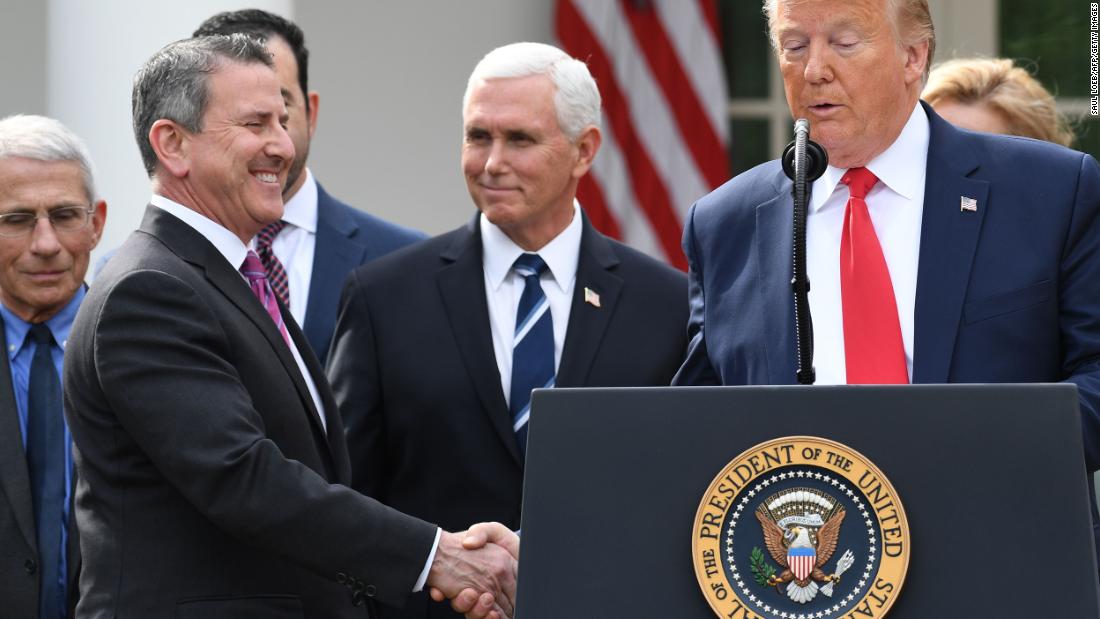Analysis: Trump's appalling, blame-shifting briefing - 4 minutes read
 And, Donald Trump?
And, Donald Trump?In each episode of his weekly YouTube show, Chris Cillizza will delve a little deeper into the surreal world of politics. Click to subscribe!
"No, I don't take responsibility at all," Trump responded when asked if he took responsibility for the lag in necessary coronavirus testing while speaking to reporters gathered in the Rose Garden to hear his declaration of a national emergency to combat the virus.
Which sums up his response to this crisis well. And, in fact, is actually a pretty nice summation of his approach to the presidency.
Call it the Michael Scott strategy of management. "I do want the credit, without any of the blame," the boss of the fictional paper company tells his employees in one episode of "The Office."
It's a remarkable thing for a President to say -- ever. But especially in the midst of a historic public health crisis defined, at least in this country, by an inability of people who need to be tested for coronavirus to get tested.
Here's the thing: Trump didn't cause the coronavirus. And any pandemic with this level of infectiousness and mortality rate is not the sort of thing that a government can probably ever a) be totally ready for and b) handle without a hitch. Mistakes are always made when government and/or the private sector is forced to confront such a massive challenge.
The real danger is when the person at the top of an organization is unwilling to own those errors. When the top leader is always looking to point the finger of blame at others, the ability of any organization to focus on the challenge at hand moving forward becomes significantly reduced. Because if the lead person is playing the blame game, you can be sure so are all of his or her underlings.
Look. It is not a new observation that Trump lacks any of the traditional traits we associate with good leaders. He seemingly always takes the low road. He villainizes opponents as evil. He doesn't tell the truth -- a lot. And he is forever looking to hog credit and deflect blame. In Trump's world, the buck stops anywhere but with him.
Just look at how he handled a series of questions during the news conference regarding what responsibility he felt for a series of decisions made by his administration.
Asked whether he took responsibility for disbanding the office of pandemics , Trump called it "a nasty question" (it wasn't) before adding: "When you say 'me,' I didn't do it. We have a group of people [in the administration]. But I could perhaps ask Tony about that, because I don't know anything about it." ("Tony" is Dr. Anthony Fauci, the head of the National Institute of Allergy and Infectious Diseases.)
As for the lack of coronavirus test kits currently available -- a "failing" acknowledged by Fauci, Trump reached back to the previous administration's handling of the H1N1 swine flu in 2009.
"Ask them how they did with swine flu," said Trump. "They had a very big disaster."
Over and over again during the news conference, Trump sought to take credit for his decision to limit travel from China and, as of midnight tonight, Europe, while refusing to take any blame at all for the obvious hiccups that have characterized the ramping up of the government response to this virus.
Or his well-documented efforts in recent weeks to downplay the severity of the illness and the threat it poses to the country and the world. In fact, Trump repeatedly sought in the news conference to suggest that this will all be over soon despite virtually no experts agreeing with that view.
"Some of the doctors say it will wash through," Trump said of the coronavirus. "It will flow through." (He didn't mention the specific doctors who told him it will "flow through.")
A leader who is so insecure that he can't accept ANY responsibility for decisions that have been made and are being made on his watch isn't a leader at all. And, unfortunately, that's what Trump's news conference revealed about him. Again.
Source: CNN
Powered by NewsAPI.org